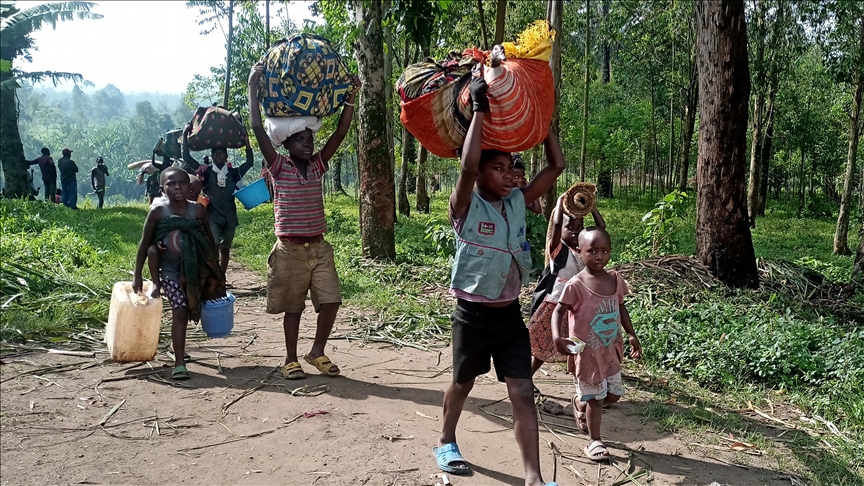 Congolese refugees, fleeing due to fighting between M23 rebels and Democratic Republic of Congo government forces, pass through Rutshuru border area, a town located in the North Kivu province of the eastern Democratic Republic of the Congo on October 26, 2022.
Congolese refugees, fleeing due to fighting between M23 rebels and Democratic Republic of Congo government forces, pass through Rutshuru border area, a town located in the North Kivu province of the eastern Democratic Republic of the Congo on October 26, 2022.
GENEVA
Uganda is facing immense pressure as a sharp increase in Congolese refugee arrivals risks overwhelming its already stretched capacity, the UN refugee agency (UNHCR) warned Tuesday.
Speaking at a UN press briefing in Geneva, UNHCR's Representative in Uganda Matthew Crentsil, said the influx is being driven by rising insecurity in the eastern Democratic Republic of Congo, with an average of 600 people now crossing into Uganda daily.
"Uganda, Africa’s largest refugee host, is witnessing a sharp increase in the number of Congolese refugees crossing its western border due to increased insecurity in the eastern part of the Democratic Republic of the Congo," Crentsil said.
"Amid ongoing funding cuts, this significant surge in refugee arrivals risks overwhelming the country’s capacity as it also responds to the needs of over 70,000 Sudanese refugees who have arrived fleeing the two-year-long war in Sudan."
New arrivals are mostly women and children, many of whom have witnessed killings, sexual violence, and other traumatic experiences, he said.
According to the representative, in Kikuube, nearly 4,000 refugees have crossed Lake Albert in overcrowded boats. Children are particularly vulnerable, with high rates of malaria and malnutrition, and since January, nine children aged under 5 reportedly died from malnutrition-related anemia at transit centers in the southwest.
Transit and reception centers, including Nyakabande and Matanda, are severely overcrowded, he said, adding: "Nyakabande, which has been hosting over 7,000 refugees, is now at six times its initial capacity."
He stressed that critical shortages of water, latrines, and bathing facilities are putting people at dire risk of deadly diseases.
Crentsil also warned that "vital services for refugees have had to be deprioritized," citing reductions in health staff, educators, and shelter construction.
Anadolu Agency website contains only a portion of the news stories offered to subscribers in the AA News Broadcasting System (HAS), and in summarized form. Please contact us for subscription options.






